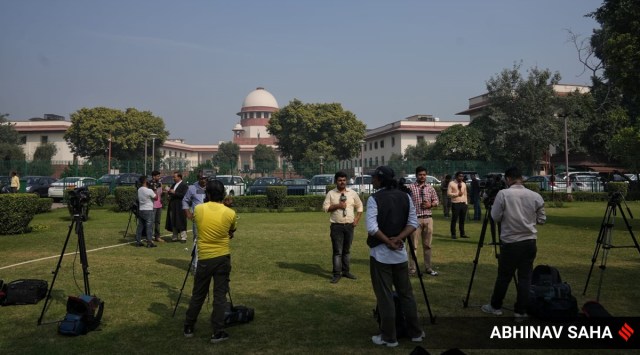SC verdict on petitions seeking legal sanctity to same-sex marriage today
As the hearing proceeded, the bench also comprising Justices S K Kaul, Ravindra Bhat, Hima Kohli, and P S Narasimha, was of the view that it’s better to proceed incrementally than to try deal with all questions arising together.
 The Delhi Commission for Protection of Child Rights (DCPCR) also advocated for recognition of marriage, filing an intervention application to assist the court on the impact of such marriages on children. (Express File Photo)
The Delhi Commission for Protection of Child Rights (DCPCR) also advocated for recognition of marriage, filing an intervention application to assist the court on the impact of such marriages on children. (Express File Photo) THE SUPREME Court will pronounce on Tuesday its decision on petitions seeking legal recognition to same-sex marriages.
A five-judge Constitution bench presided by CJI D Y Chandrachud had reserved its verdict in matter on May 11, after a hearing that lasted 10 days.
While the petitioners have sought legal recognition by rewording The Special Marriage Act (SMA), 1954, the Centre has maintained that the matter is sensitive and is best left to the legislature. The government said that the prayer seeking legal sanction entails the “judicial creation of a social institution called ‘marriage’ of a different kind than contemplated in the existing law”. It said that marriage “is a socio-legal institution which can be created, recognised, conferred with legal sanctity and regulated only [by making incidental provisions like divorce, alimony, etc.] by the competent legislature by way of an Act under Article 246 of the Constitution of India”.
As the hearing proceeded, the bench also comprising Justices S K Kaul, Ravindra Bhat, Hima Kohli, and P S Narasimha, was of the view that it’s better to proceed incrementally than to try deal with all questions arising together.
“Sometimes incremental changes in issues of societal ramifications are better. There is time for everything. Therefore what was being suggested, can we for the time being confine only to limited issue, and not step into personal law issues,” said the bench.
Supreme Court to pronounce judgment on petitions seeking legal recognition of same sex marriages tomorrow, October 17. @IndianExpress
— Ananthakrishnan G (@axidentaljourno) October 16, 2023
The court also said that “between (the SC’s ruling in) Navtej Johar (wherein Section 377 was held unconstitutional) and today, our society has found much greater acceptance of same-sex couples. That’s very positive because you find that there is a greater acceptance in our Universities”. It said that “in this evolving consensus, the court is also playing a dialogical role to create that consensus and move towards an equal future” and added that once Section 377 had been decriminalised, perhaps the stage had been set to acknowledge a more “stable emotional relationship” like same-sex marriage.
The petitioners argued that marriage is not only a question of dignity but also carried with it a bouquet of rights that LGBTQ community is denied post-Navtej Johar, e.g. bank account, life insurance, medical insurance. They contended that implied exclusion of entire LGBTQ class from Special Marriage Act (SMA) is based on a sole marker of identity, sex and sexual orientation and said that any relief short of full marriage would mean that LGBTQ community will have to keep coming back to court to litigate individual issues of discrimination.
But the court reminded that even in the Puttaswamy case wherein privacy was held as a fundamental right, “we found that there were nuances that came up later. It may require more visits to court. We can’t say. But we cannot say that it will be possible to work out all possible nuances now”.
Batting for concomitant changes in other laws, petitioners said that the language of law should be modified and wherever husband and wife is used, it should be made gender-neutral by using “spouse” and where man and woman is used, it should be made gender-neutral by saying “person.” The bench said that everything can’t change at once and other will take some time.
The hearing also saw the SC quizzing the government on what it was willing to do to ensure conditions for the security and social welfare of same-sex couples and save them from ostracisation even if it was unwilling to grant legal recognition to such marriages.
In response, Centre assured it will form a committee headed by cabinet secretary to address “human concerns” of same-sex couples without legally recognising their relationship as a marriage.







